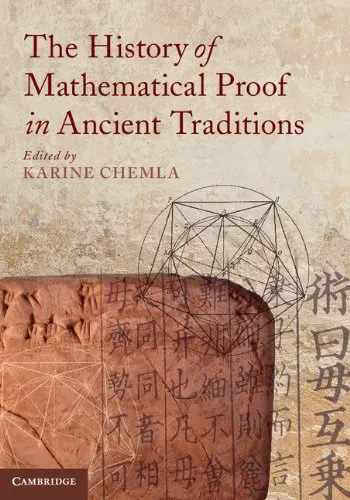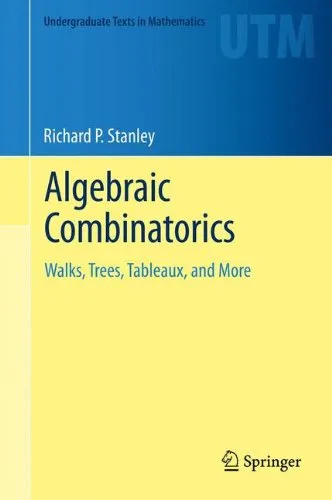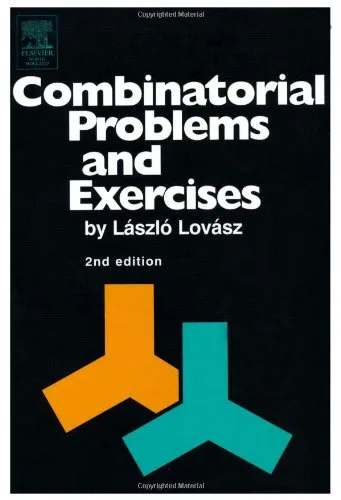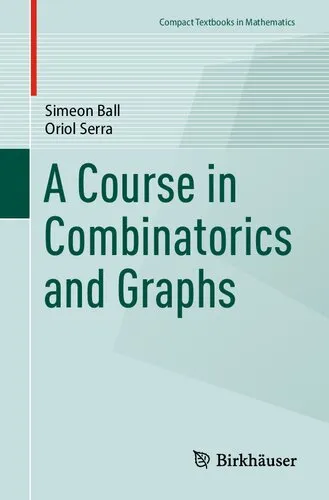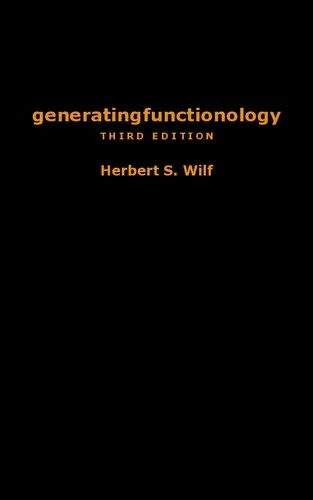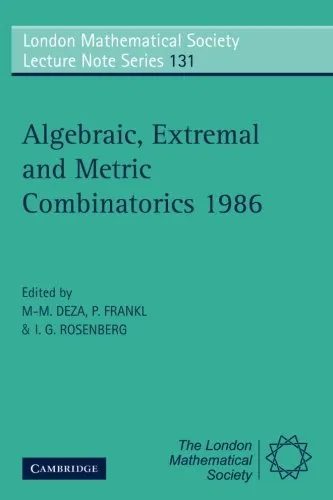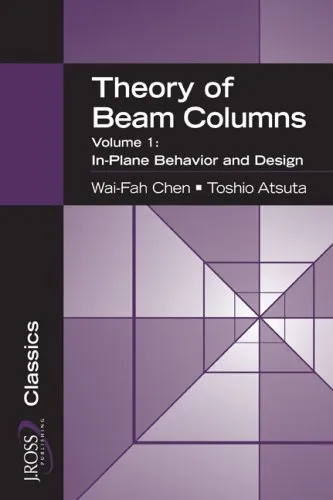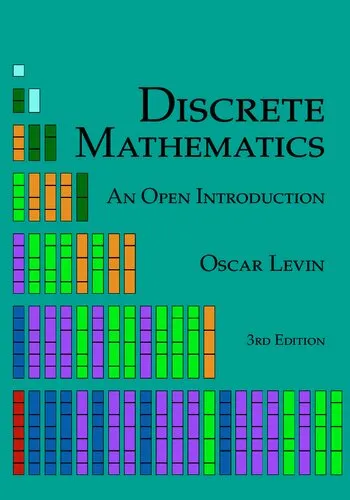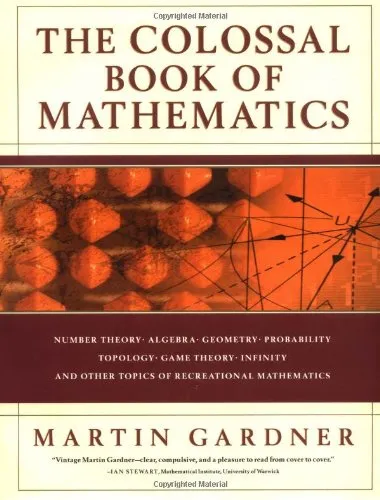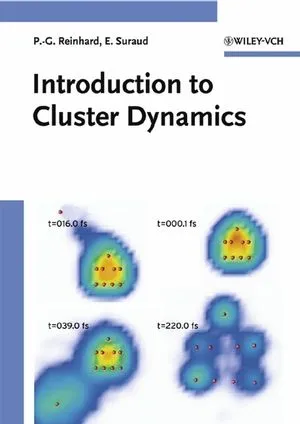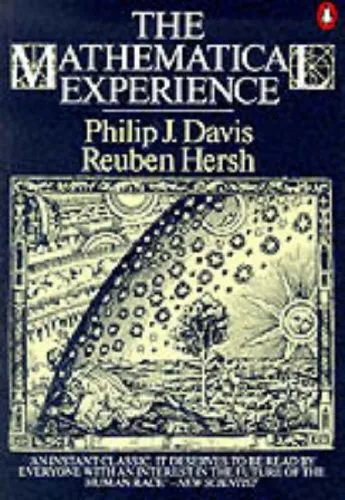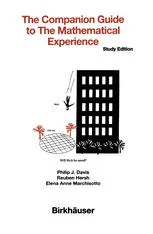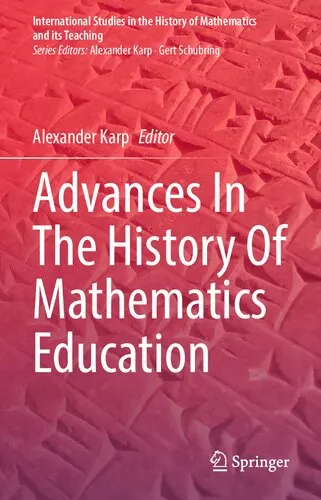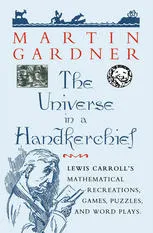The History of Mathematical Proof in Ancient Traditions
4.0
بر اساس نظر کاربران

شما میتونید سوالاتتون در باره کتاب رو از هوش مصنوعیش بعد از ورود بپرسید
هر دانلود یا پرسش از هوش مصنوعی 2 امتیاز لازم دارد، برای بدست آوردن امتیاز رایگان، به صفحه ی راهنمای امتیازات سر بزنید و یک سری کار ارزشمند انجام بدینکتاب های مرتبط:
معرفی کتاب "The History of Mathematical Proof in Ancient Traditions"
کتاب "The History of Mathematical Proof in Ancient Traditions"، به ویراستاری کارین چِملا، اثری برجسته است که به بررسی تاریخچه و چگونگی ایجاد و تحول مفهوم Proof (برهان) در ریاضیات سنتهای باستانی میپردازد. این کتاب نشان میدهد که چگونه سنتهای مختلف در جهان باستان به شیوههای متفاوتی به توسعه Proof در ریاضیات پرداختهاند و چگونه این رویکردها بر شناخت مدرن ما از ریاضیات تأثیر گذاشتهاند.
خلاصهای از کتاب
این اثر چندبعدی به بررسی ریاضیات سنتهای باستانی در تمدنهای بزرگ شامل چین، هند، بابل، یونان و اسلام میپردازد. هر فصل از کتاب توسط متخصصی در زمینه خاص آن تمدن نوشته شده و به جزییات تاریخی و فلسفی Proof میپردازد. کتاب نشان میدهد که مفهوم Proof و روشهای ابداعشده برای اثبات قضایا، بستری برای درک بهتر ریاضیات و جایگاه آن در جوامع مختلف فراهم کردهاند. کتاب همچنین به این که چگونه سنتهای محلی و نیازهای فرهنگی در هر جامعه ایجاد و پیشرفت Proof را تحت تأثیر قرار دادهاند، پرداخته است.
نکات کلیدی
- تمایز رویکردهای ریاضیاتی در تمدنهای مختلف و تأثیر آن بر روششناسی قرون بعدی.
- تحلیل و مطالعه ارتباط بین تاریخ، فلسفه و ریاضیات در ایجاد مفهوم Proof.
- ارتباط بین تغییرات اجتماعی-فرهنگی و توسعه مفاهیم ریاضی.
- بررسی دقیق اسناد تاریخی و ریاضیاتی برای شناخت سیر تکاملی تفکر ریاضی.
- بررسی تفاوتها و شباهتهای میان روشهای اثبات در سنتهای باستانی.
نقلقولهای معروف از کتاب
«Proof نهتنها بهعنوان وسیلهای برای نمایش حقیقت در ریاضیات عمل میکند، بلکه همچنین نمایی از تفکر فلسفی و فرهنگی هر تمدن است.»
«تناقضات موجود در روشهای مختلف اثبات، نمایانگر تنوع رویکردهای فکری در میان جوامع باستانی است.»
«ریاضیات تمدنهای مختلف، پلی است بین علوم طبیعی و فرهنگی، که با مطالعه آنها میتوان چشماندازی نو به بشریت و علم گشود.»
چرا این کتاب مهم است؟
این کتاب از چند جهت اهمیت دارد. ابتدا، مطالعه تاریخی و تطبیقی مفاهیم ریاضی مانند Proof به ما کمک میکند درک عمیقتری از پیدایش ریاضیات مدرن پیدا کنیم. تاریخ نشان میدهد که چگونه تمدنهای مختلف با چالشهای علمی روبهرو شدهاند و چگونه راهحلهای بومی و ابتکاری برای این مشکلات ارائه دادهاند. علاوه بر این، این اثر به ما یادآوری میکند که ریاضیات تنها یک موضوع علمی نیست، بلکه بخشی از تاریخ فرهنگی و فلسفی بشریت است. این اثر پژوهشی، مخاطبان خود را به شکلی عمیقتر با تاریخ ریاضیات و تأثیرات آن بر عصر حاضر آشنا میکند.
برای محققان و علاقهمندان به تاریخ علم، فلسفه و ریاضیات، این کتاب منبعی ارزشمند و بیبدیل است. همچنین، رویکرد چندنویسندگی کتاب باعث شده تا خواننده بتواند از زوایای مختلف به موضوع نگریسته و نگرشی جامعتر پیدا کند. موضوعات و ایدههای مطرحشده در این اثر میتوانند به پژوهشهای جدید و بینرشتهای در آینده منجر شوند.
Introduction to "The History of Mathematical Proof in Ancient Traditions"
"The History of Mathematical Proof in Ancient Traditions" is a monumental work that explores how diverse cultures in the ancient world developed and used mathematical proofs. Edited by Karine Chemla, this book brings together perspectives from leading scholars worldwide, making it a definitive source on an important yet often under-explored topic in the history of mathematics. The book delves deeply into the epistemological foundations, practices, and philosophical perspectives surrounding mathematical proof across ancient civilizations, turning the spotlight on cultures such as ancient China, India, Greece, and the Islamic world.
In this extensive collection of essays, readers are invited to understand how mathematical reasoning was formalized in different intellectual traditions, what roles proofs played within their specific contexts, and how this understanding shaped the global history of mathematics. The book’s interdisciplinary approach introduces themes at the intersection of mathematics, philosophy, history, and culture, making it a compelling read for specialists and enthusiasts alike.
Detailed Summary of the Book
This book examines the rich heritage of proving mathematical propositions in ancient civilizations, providing a comparative analysis of methods and practices across cultures. It connects the methodology of mathematical proof-making to the larger intellectual frameworks of the societies in which they arose, such as their philosophical, religious, and educational systems.
The volume is divided into several chapters, written by renowned experts, which collectively shed light on ancient China’s systematic use of algorithms, the logical rigor employed in Greek geometry, and the innovative contributions of Indian mathematicians to algebraic thought and combinatorics. Additionally, the Islamic mathematical tradition is discussed, highlighting its synthesis of Greek, Indian, and Persian knowledge to create new forms of logical arguments.
What sets this book apart is its emphasis on contextualizing mathematical proofs within the social and intellectual environments that shaped them. For instance, the book explores how proofs functioned as pedagogical tools, cultural artifacts, and instruments of intellectual authority. By doing so, it offers an unparalleled view of both the universality and specificity of mathematical practices across ancient traditions.
Key Takeaways
- Mathematical proofs are not only logical constructs but also cultural artifacts that reflect the intellectual priorities of the societies in which they were developed.
- Different ancient civilizations approached mathematical proof-making in unique ways, yet a global perspective reveals shared goals and methodologies.
- The act of proving in mathematics was deeply tied to other domains, such as philosophy, allowing for an interdisciplinary understanding of knowledge systems.
- The use and acceptance of mathematical proofs evolved over time, showing a clear interaction between tradition, innovation, and cross-cultural exchanges.
Famous Quotes from the Book
"To understand the history of mathematics, one must first understand the history of proof. Proof is not merely a collection of rules; it is the soul of mathematical reasoning." – Karine Chemla
"The diversity of mathematical traditions is a testament to the human mind's capacity to create systems that explain, classify, and prove the workings of the universe." – Contributing Author
"Through studying ancient proofs, we see that knowledge is not static but dynamic and shaped by the societies that produce it." – Karine Chemla
Why This Book Matters
"The History of Mathematical Proof in Ancient Traditions" is an essential contribution to our understanding of how human beings have sought certainty in mathematics across cultures and centuries. It dismantles the conventional Eurocentric narrative of mathematics' history, emphasizing that mathematical proofs were not only thriving in classical Greece but were also vibrant and innovative in other parts of the world, such as China, India, and the Islamic world.
This book encourages readers to rethink the development of mathematics as a global, interconnected process rather than a linear progression confined to one cultural tradition. It sheds light on the diverse pathways through which mathematical thought has evolved and invites readers to appreciate the intellectual ingenuity of ancient societies.
Ultimately, this book matters because it reminds us of the power of proof, not only as a mathematical tool but also as a philosophical endeavor that seeks to establish truth. It broadens our understanding of what constitutes knowledge and underscores the universal human quest for understanding and explaining the world.
دانلود رایگان مستقیم
شما میتونید سوالاتتون در باره کتاب رو از هوش مصنوعیش بعد از ورود بپرسید
دسترسی به کتابها از طریق پلتفرمهای قانونی و کتابخانههای عمومی نه تنها از حقوق نویسندگان و ناشران حمایت میکند، بلکه به پایداری فرهنگ کتابخوانی نیز کمک میرساند. پیش از دانلود، لحظهای به بررسی این گزینهها فکر کنید.
این کتاب رو در پلتفرم های دیگه ببینید
WorldCat به شما کمک میکنه تا کتاب ها رو در کتابخانه های سراسر دنیا پیدا کنید
امتیازها، نظرات تخصصی و صحبت ها درباره کتاب را در Goodreads ببینید
کتابهای کمیاب یا دست دوم را در AbeBooks پیدا کنید و بخرید
1449
بازدید4.0
امتیاز0
نظر98%
رضایتنظرات:
4.0
بر اساس 0 نظر کاربران
Questions & Answers
Ask questions about this book or help others by answering
No questions yet. Be the first to ask!
